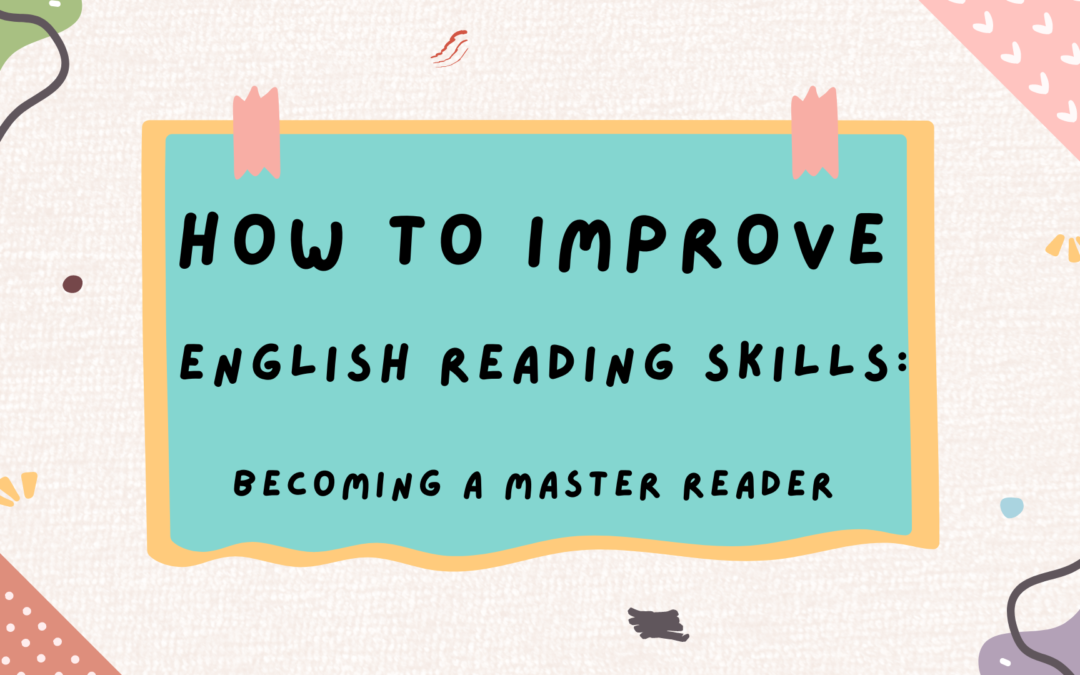Reading is more than just a skill; it’s a gateway to knowledge, adventure, and lifelong learning. If you’re looking to improve your English reading skills, whether for academic purposes, work, or personal pleasure, you’ve come to the right place. This guide will walk you through practical steps to become a more effective and confident reader.
Start with Clear Goals
Before you start working on your reading skills, it’s important to set some clear goals. Think about what you want to achieve. Are you trying to read more books this year? Do you want to improve your reading speed? Or are you focusing on understanding complex texts better? Keeping specific goals in mind will assist you in maintaining focus and tracking your progress.
Make Reading a Daily Habit
Improving any skill takes practice, and reading is no exception. Try to read something every day. You don’t have to spend hours at a time. Just 15-30 minutes per day can make a significant difference. Choose a quiet, comfortable spot where you can read without interruptions. Over time, this daily habit will help you read more fluently and with greater enjoyment.
Choose Material That Interests You
One of the easiest ways to make reading more enjoyable is to pick books, articles, or other materials that interest you. If you’re a beginner, start with simpler texts like children’s books or young adult fiction. These are often more engaging and easier to understand. As your skills improve, you can gradually tackle more challenging materials.
Expand Your Vocabulary
A strong vocabulary is key to good reading skills. Whenever you come across a word you don’t know, make a note of it. Look it up in a dictionary and try to use it in a sentence to help it stick in your memory. There are also apps and tools like flashcards that can help you learn and remember new words.
Practice Active Reading
Active reading means engaging with the text rather than just passively moving your eyes over the words. Take notes, highlight important points, and summarize sections in your own words. Ask yourself questions about what you’re reading and try to predict what will happen next. This will help you understand and remember the material better.
Try Different Reading Techniques
Different types of texts call for different reading strategies. Here are some methods you can employ:
- Skimming: Quickly run your eyes over the text to get the main idea.
- Scanning: Look for specific information or keywords without reading everything.
- In-Depth Reading: Read slowly and carefully to fully understand the text.
By using these techniques, you can become more flexible and efficient in your reading.
Join a Reading Group
Reading doesn’t have to be a solitary activity. Joining a reading group or book club can be a great way to stay motivated and enjoy reading more. Discussing books with others can give you new insights and perspectives that you might not get on your own. Plus, it’s a fun way to socialize and make new friends.
Use Technology to Your Advantage
There are many digital tools that can help you improve your reading skills. E-readers, for example, often have built-in dictionaries and note-taking features. Apps like Goodreads can help you keep track of what you’ve read and discover new books. Websites like Project Gutenberg offer thousands of free eBooks that you can download and read.
Explore Different Genres
Reading a variety of genres can help you improve your reading skills in different ways. Don’t just stick to one type of book. Try reading fiction, non-fiction, poetry, news articles, and academic papers. Each genre has its own style and vocabulary, which can help you become a more versatile reader.
Read Aloud
Reading aloud can be a great way to improve your pronunciation and fluency. It forces you to slow down and pay attention to the structure of the sentences. This can be particularly helpful if you’re learning English as a second language. Try reading to a friend, family member, or even just to yourself.
Take Care of Your Eyes
Long reading sessions can be hard on your eyes, so it’s important to take care of them. Make sure you’re reading in a well-lit area to reduce eye strain. Take regular breaks to rest your eyes—every 20 minutes, look at something 20 feet away for at least 20 seconds. This simple rule can help prevent eye fatigue and keep you comfortable while reading.
Reflect on What You Read
After you finish a book or an article, take some time to reflect on it. Think about what you learned and how it relates to other things you know. Writing a summary or a review can help you process and remember the information. Discussing it with a friend or comparing it with similar works can also deepen your understanding.
Putting It All Together
Improving your English reading skills is a journey that takes time and effort, but it’s well worth it. By setting clear goals, making reading a daily habit, choosing interesting material, expanding your vocabulary, practicing active reading, using different techniques, joining a reading group, leveraging technology, exploring different genres, reading aloud, taking care of your eyes, and reflecting on what you read, you can become a more effective and confident reader.
Remember, the more you read, the better you’ll get. So start today, pick up a book, and enjoy the journey of becoming a master reader.

